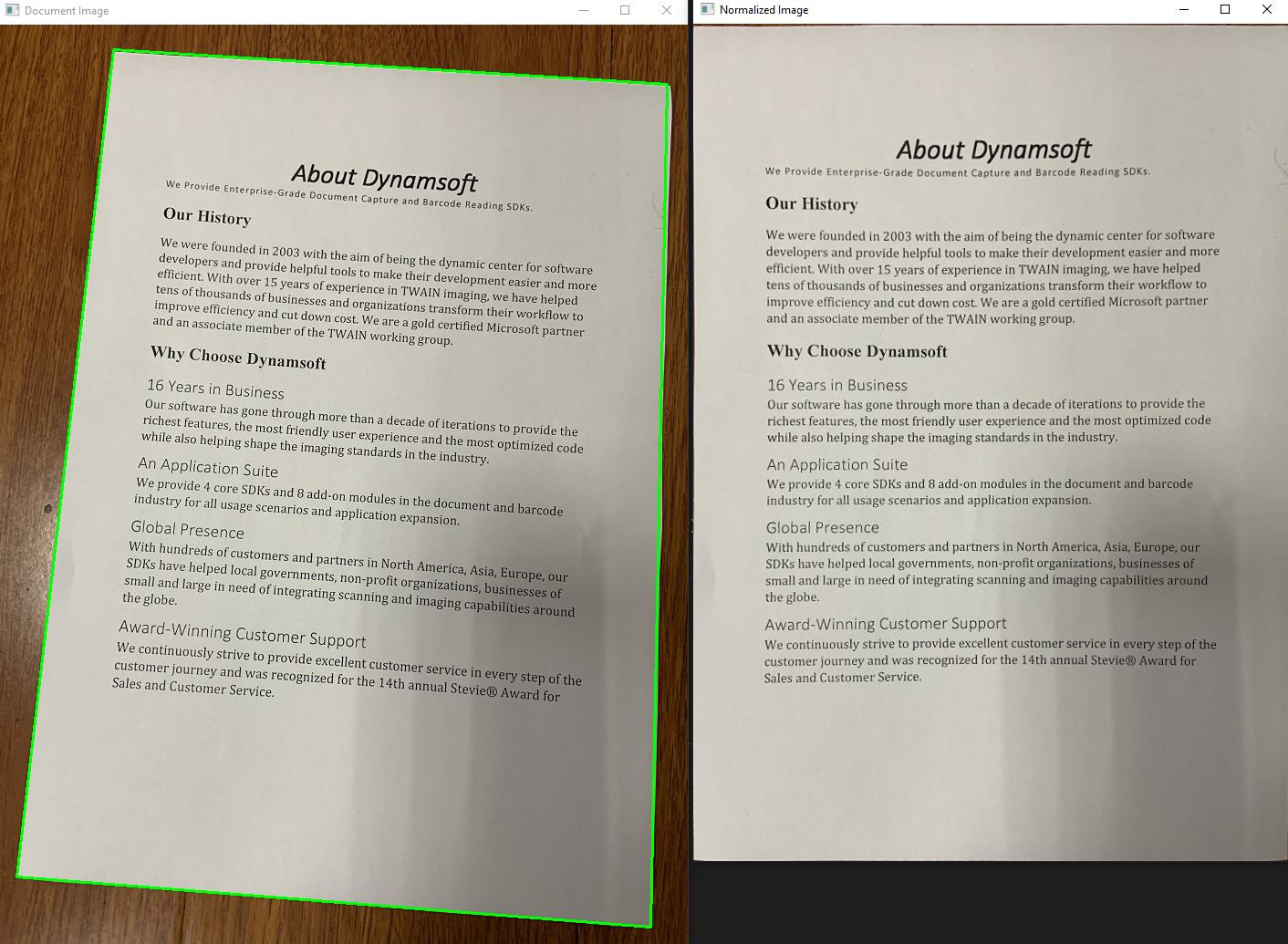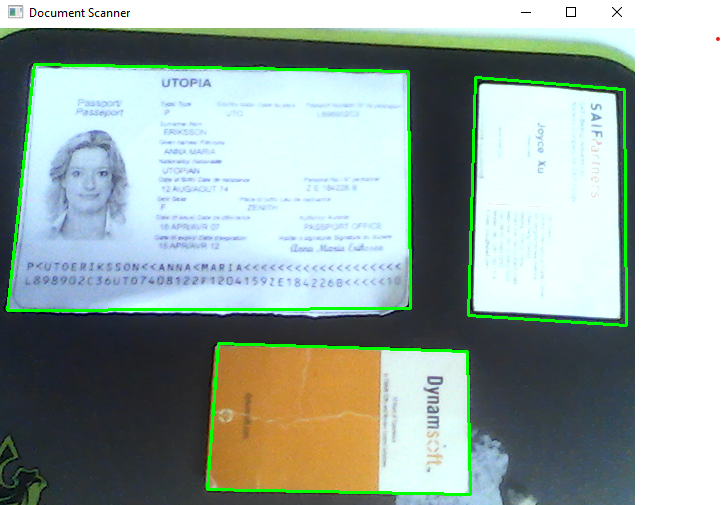The project is a Python binding to Dynamsoft C/C++ Document Scanner SDK. It aims to help developers quickly build desktop document scanner applications in Python on Windows and Linux.
Get a 30-day FREE trial license to activate the SDK.
- Python 3.x
pip install opencv-python# Scan documents from images
$ scandocument -f <file-name> -l <license-key>
# Scan documents from camera video stream
$ scandocument -c 1 -l <license-key>-
Scan documents from an image file:
import argparse import docscanner import sys import numpy as np import cv2 import time def showNormalizedImage(name, normalized_image): mat = docscanner.convertNormalizedImage2Mat(normalized_image) cv2.imshow(name, mat) return mat def process_file(filename, scanner): image = cv2.imread(filename) results = scanner.detectMat(image) for result in results: x1 = result.x1 y1 = result.y1 x2 = result.x2 y2 = result.y2 x3 = result.x3 y3 = result.y3 x4 = result.x4 y4 = result.y4 normalized_image = scanner.normalizeBuffer(image, x1, y1, x2, y2, x3, y3, x4, y4) showNormalizedImage("Normalized Image", normalized_image) cv2.drawContours(image, [np.int0([(x1, y1), (x2, y2), (x3, y3), (x4, y4)])], 0, (0, 255, 0), 2) cv2.imshow('Document Image', image) cv2.waitKey(0) normalized_image.save(str(time.time()) + '.png') print('Image saved') def scandocument(): """ Command-line script for scanning documents from a given image """ parser = argparse.ArgumentParser(description='Scan documents from an image file') parser.add_argument('-f', '--file', help='Path to the image file') parser.add_argument('-l', '--license', default='', type=str, help='Set a valid license key') args = parser.parse_args() # print(args) try: filename = args.file license = args.license if filename is None: parser.print_help() return # set license if license == '': docscanner.initLicense("DLS2eyJoYW5kc2hha2VDb2RlIjoiMjAwMDAxLTE2NDk4Mjk3OTI2MzUiLCJvcmdhbml6YXRpb25JRCI6IjIwMDAwMSIsInNlc3Npb25QYXNzd29yZCI6IndTcGR6Vm05WDJrcEQ5YUoifQ==") else: docscanner.initLicense(license) # initialize mrz scanner scanner = docscanner.createInstance() ret = scanner.setParameters(docscanner.Templates.color) if filename is not None: process_file(filename, scanner) except Exception as err: print(err) sys.exit(1) scandocument()
-
Scan documents from camera video stream:
import argparse import docscanner import sys import numpy as np import cv2 import time g_results = None g_normalized_images = [] def callback(results): global g_results g_results = results def showNormalizedImage(name, normalized_image): mat = docscanner.convertNormalizedImage2Mat(normalized_image) cv2.imshow(name, mat) return mat def process_video(scanner): scanner.addAsyncListener(callback) cap = cv2.VideoCapture(0) while True: ret, image = cap.read() ch = cv2.waitKey(1) if ch == 27: break elif ch == ord('n'): # normalize image if g_results != None: g_normalized_images = [] index = 0 for result in g_results: x1 = result.x1 y1 = result.y1 x2 = result.x2 y2 = result.y2 x3 = result.x3 y3 = result.y3 x4 = result.x4 y4 = result.y4 normalized_image = scanner.normalizeBuffer(image, x1, y1, x2, y2, x3, y3, x4, y4) g_normalized_images.append((str(index), normalized_image)) mat = showNormalizedImage(str(index), normalized_image) index += 1 elif ch == ord('s'): # save image for data in g_normalized_images: # cv2.imwrite('images/' + str(time.time()) + '.png', image) cv2.destroyWindow(data[0]) data[1].save(str(time.time()) + '.png') print('Image saved') g_normalized_images = [] if image is not None: scanner.detectMatAsync(image) if g_results != None: for result in g_results: x1 = result.x1 y1 = result.y1 x2 = result.x2 y2 = result.y2 x3 = result.x3 y3 = result.y3 x4 = result.x4 y4 = result.y4 cv2.drawContours(image, [np.int0([(x1, y1), (x2, y2), (x3, y3), (x4, y4)])], 0, (0, 255, 0), 2) cv2.putText(image, 'Press "n" to normalize image', (10, 30), cv2.FONT_HERSHEY_SIMPLEX, 0.8, (0, 0, 255), 2) cv2.putText(image, 'Press "s" to save image', (10, 60), cv2.FONT_HERSHEY_SIMPLEX, 0.8, (0, 0, 255), 2) cv2.putText(image, 'Press "ESC" to exit', (10, 90), cv2.FONT_HERSHEY_SIMPLEX, 0.8, (0, 0, 255), 2) cv2.imshow('Document Scanner', image) def scandocument(): """ Command-line script for scanning documents from camera video stream. """ parser = argparse.ArgumentParser(description='Scan documents from camera') parser.add_argument('-c', '--camera', default=False, type=bool, help='Whether to show the image') parser.add_argument('-l', '--license', default='', type=str, help='Set a valid license key') args = parser.parse_args() # print(args) try: license = args.license camera = args.camera if camera is False: parser.print_help() return # set license if license == '': docscanner.initLicense("DLS2eyJoYW5kc2hha2VDb2RlIjoiMjAwMDAxLTE2NDk4Mjk3OTI2MzUiLCJvcmdhbml6YXRpb25JRCI6IjIwMDAwMSIsInNlc3Npb25QYXNzd29yZCI6IndTcGR6Vm05WDJrcEQ5YUoifQ==") else: docscanner.initLicense(license) # initialize mrz scanner scanner = docscanner.createInstance() ret = scanner.setParameters(docscanner.Templates.color) if camera is True: process_video(scanner) except Exception as err: print(err) sys.exit(1) scandocument()
-
docscanner.initLicense('YOUR-LICENSE-KEY')# set the license keydocscanner.initLicense("DLS2eyJoYW5kc2hha2VDb2RlIjoiMjAwMDAxLTE2NDk4Mjk3OTI2MzUiLCJvcmdhbml6YXRpb25JRCI6IjIwMDAwMSIsInNlc3Npb25QYXNzd29yZCI6IndTcGR6Vm05WDJrcEQ5YUoifQ==")
-
docscanner.createInstance()# create a Document Scanner instancescanner = docscanner.createInstance()
-
detectFile(filename)# do edge detection from an image fileresults = scanner.detectFile(<filename>)
-
detectMat(Mat image)# do edge detection from Matimage = cv2.imread(<filename>) results = scanner.detectMat(image) for result in results: x1 = result.x1 y1 = result.y1 x2 = result.x2 y2 = result.y2 x3 = result.x3 y3 = result.y3 x4 = result.x4 y4 = result.y4
-
setParameters(Template)# Select color, binary or grayscale templatescanner.setParameters(docscanner.Templates.color)
-
addAsyncListener(callback function)# start a native thread to run document scanning tasks -
detectMatAsync(<opencv mat data>)# put a document scanning task into the native queuedef callback(results): for result in results: print(result.x1) print(result.y1) print(result.x2) print(result.y2) print(result.x3) print(result.y3) print(result.x4) print(result.y4) import cv2 image = cv2.imread(<filename>) scanner.addAsyncListener(callback) scanner.detectMatAsync(image) sleep(5)
-
normalizeBuffer(mat, x1, y1, x2, y2, x3, y3, x4, y4)# do perspective correction from Matnormalized_image = scanner.normalizeBuffer(image, x1, y1, x2, y2, x3, y3, x4, y4)
-
normalizeFile(filename, x1, y1, x2, y2, x3, y3, x4, y4)# do perspective correction from a filenormalized_image = scanner.normalizeFile(<filename>, x1, y1, x2, y2, x3, y3, x4, y4)
-
normalized_image.save(filename)# save the normalized image to a filenormalized_image.save(<filename>)
-
normalized_image.recycle()# release the memory of the normalized image -
clearAsyncListener()# stop the native thread and clear the registered Python function
To customize Python API based on C/C++, please refer to the online documentation.
-
Create a source distribution:
python setup.py sdist
-
setuptools:
python setup_setuptools.py build python setup_setuptools.py develop
-
Build wheel:
pip wheel . --verbose # Or python setup.py bdist_wheel

